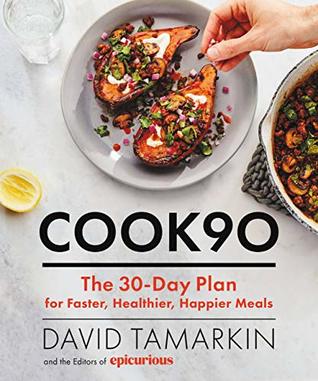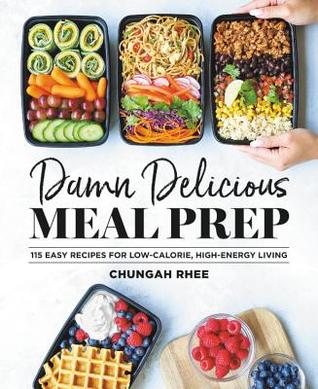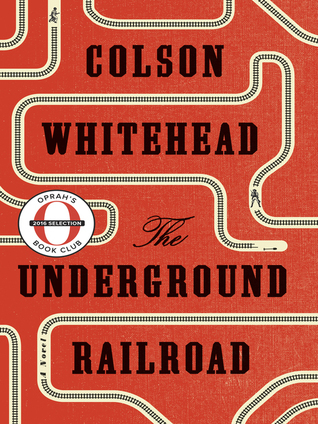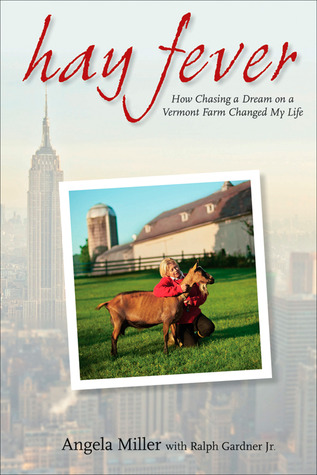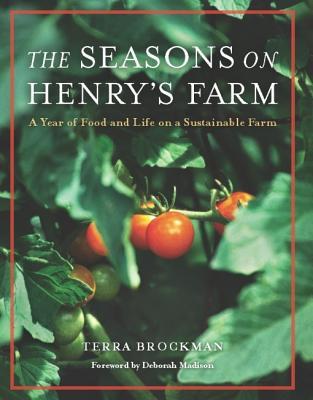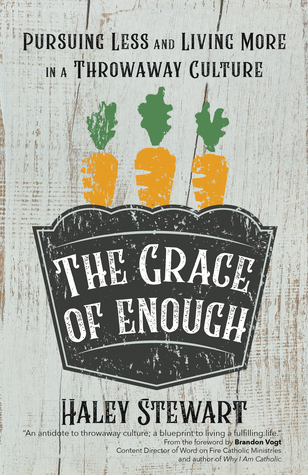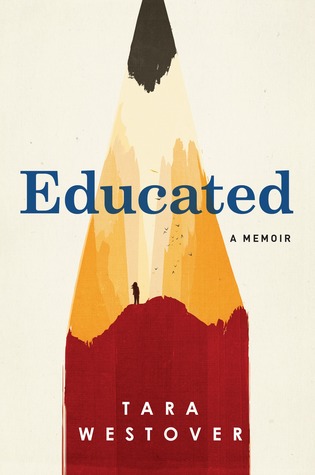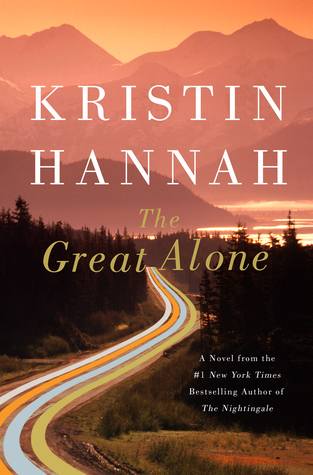Educated by Tara Westover (Books & Banter)
The first time Tara Westover heard of the Holocaust she was in a college classroom. Westover grew up the youngest of seven children born to survivalist Mormon parents. Westover's father owned a scrap metal yard and sometimes worked construction and her mother was a midwife and herbalist. They didn't believe in public education or modern medicine - all the children were homeschooled, but mostly that meant working either in the scrap yard or in the kitchen (but only for Tara and her sister since women belong in the kitchen). This is the life Tara sees herself living as an adult since she knows nothing else. But when her older brother Tyler gets into college he opens the door to her as well. He encourages her to take the ACT and after teaching herself enough math to pass she is accepted to BYU. Once in college Tara begins to see that almost everything she was taught by her parents was wrong, but by reading and studying Tara begins to open more doors for herself through education. But, going home between semesters gets harder and harder as she begins to see her family and life growing up through new eyes - her father is very likely bipolar and her brother Shawn is violently abusive to everyone in his path (and it's excused away by her family time and time again). Finally after Shawn repeatedly threatens to kill her she is cut off by her family - she didn't cut them off THEY cut her off as she is obviously demon-possessed for wanting Shawn to address his issues. She is able to maintain a relationship with two of her brothers - both of whom are educated and aren't financially tied to the family businesses. In the same vein of The Glass Castle, it's a miracle that Westover is able to get out of her family and graduate with a PhD, but Westover's childhood was much more abusive. It's really a miracle that all seven children lived into adulthood with the horrific accidents and injuries that happened to most of them - only going to the hospital with the direst of injuries and often not even then. Westover shows the value of education through her life story and is an inspiration.
Some quotes I liked:
"'I know you think we're being unfair,' she said. 'but when I was your age I was living on my own, getting ready to marry your father.' 'You were married at sixteen?' I said. 'Don't be silly,' she said. 'You are not sixteen.' I stared at her. She stared at me. 'Yes, I am. I'm sixteen.' She looked me over. 'You're at least twenty.' She cocked her head. 'Aren't you?' We were silent. My heart pounded in my chest. 'I turned sixteen in September,' I said. 'Oh.' Mother bit her lip, then she stood and smiled. 'Well, don't worry about it then. You can stay. Don't know what your dad was thinking, really. I guess we forgot. Hard to keep track of how old you kids are.'" (p. 137)
"...I had finally begun to grasp something that should have been immediately apparent: that someone had opposed the great march toward equality; someone had been the person from whom freedom had to be wrested. I did not think of my brother as that person; I doubt I will ever think of him that way. But something had shifted nonetheless. I had started on a path of awareness, had perceived something elemental about my brother, my father, myself. I had discerned the ways in which we had been sculpted by a tradition given to us by others, a tradition of which we were either willfully or accidentally ignorant. I had begun to understand that we had lent our voices to a discourse whose sole purpose was to dehumanize and brutalize others - because nurturing that discourse was easier, because retaining power always feelslike the way forward." (p. 180)
"'I have been teaching in Cambridge for thirty years,' he said. 'And this is one of the best essays I've read.' I was prepared for insults but not for this...I could tolerate any form of cruelty better than kindness. Praise was a poison to me; I choked on it. I wanted the professor to shout at me, wanted it so deeply I felt dizzy from the deprivation." (p. 240)
"I'd never heard anyone use the word 'feminism' as anything but a reprimand. At BYU, 'You sound like a feminist' signaled the end of the argument. It also signaled that I had lost." (p. 258)
"Everything I had worked for, all my years of study, had been to purchase for myself this one privilege: to see and experience more truths than those given to me by my father, and to use those truths to construct my own mind. I had come to believe that the ability to evaluate many ideas, many histories, many points of view, was at the heart of what it means to self-create. If I yielded now, I would lose more than an argument. I would lose custody of my own mind. This was the price I was being asked to pay, I understood that now. What my father wanted to cast from me wasn't a demon: it was me." (p. 304)
"I didn't understand it then, and I don't understand it now, but there was something nourishing in setting aside that time each week, in the act of admitting that I needed something I could not provide for myself." (p. 316)
"Now I thought about it, I realized that all my siblings, except Richard and Tyler, were economically dependent on my parents. My family was splitting down the middle - the three who had left the mountain, and the four who had stayed. The three with doctorates, and the four without high school diplomas. A chasm had appeared, and was growing." (p. 326)
The Great Alone by Kristin Hannah (Evening Edition)
It's 1974 and 13-year-old Leni's parents are packing up a VW Bus to drive to Alaska. Her father Ernt just found out that his army buddy who died in Vietnam left his Alaskan homestead to him. Ever since Ernt came home after being a POW in Vietnam nothing has been the same. He drinks too much and can't keep a job, so they move from place to place always seeking a fresh start where "things will be different this time." But Alaska is not for the weak. With help from some neighbors the Allbrights make it through their first year in Alaska, but the severe cold and long nights don't help Ernt's issues. He is becoming more and more violent and controlling and everything explodes one night. Leni and her mother flee Alaska leaving behind more than they can imagine.
So, this is the second Kristin Hannah book I've read and they both follow the same formula - good story idea + LOTS of melodrama + every single thread is neatly wrapped up perfectly at the end. Yes, there was violence and bad situations, but just like in The Nightingale it's like a Lifetime TV movie version of something that could have been great.
*Spoiler Alert*
Seriously the Dad's name is Ernt - what kind of ridiculous name is that?! Why not Ernest or Ernie? Are there any real Ernt's out there? Also, there is no way in hell this family would have made it through the first year in Alaska. In just a few years they have become true, hard-core Alaskans and Ernt is telling newcomers to go back home - oh, you mean where YOU came from like 2 years ago?! The first red flag of too-neat storylines was the "intervention" Tom Walker and Marge had with Ernt - that would NEVER have happened after literally EVERY character talks about how you can do whatever you want in Alaska and everyone will leave you alone - well, I guess everything but beat your wife. While it did make for a tear-jerker ending, what happened with Leni and Matthew almost dying, then being reunited with their son years later is so unbelievably unrealistic. More realistic (and sad) would have been Matthew dying, then Leni and their son coming back to live with Tom later. It was just too much. I'm sure my book club will LOVE this one as they LOVED The Nightingale, but I'm done with Kristin Hannah after this one.
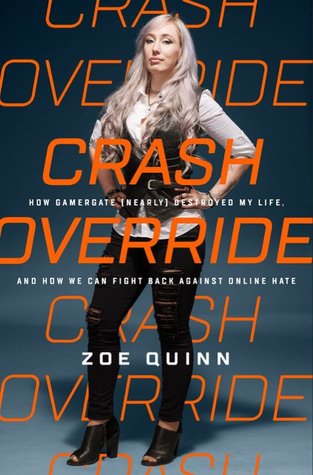
Crash Override by Zoe Quinn
Zoe Quinn was a game developer who was mass cyber-attacked by her ex-boyfriend when she broke up with him. Thinking it would only go on for a few weeks she tried to fight back as best she could, reporting all the vile comments to whatever medium it was on. She quickly realized this was something different, the abuse wasn't stopping and the threats were all-too real. She and her currently boyfriend lost jobs and couldn't go home due to the death and rape threats she was receiving not just daily, by almost every minute of every day. So how did this happen? Why wouldn't tech giants like Twitter or Google DO anything to stop this violent assault? That's what Quinn explores in this book. She tells her story and throughout she also includes information about why tech companies don't want to ban people or have more thoughtful security measures. Based on her horrific experience (that's still going on just on a smaller scale) she gives tips on how to protect your online life and also what to do if you become a target of the internet hate-mobs. I remember this story when it came out, but unfortunately like many terrible stories you think, 'Wow. That sucks, good for her for trying to fight back.' and you go on your merry way not thinking about the aftermath for her. This book exposes the aftermath for Quinn, but also how real the threat of internet hate-mobs is for anyone. Like anything else the internet can be great, but Quinn's story shows how quickly it can turn VERY ugly. Good for her for not only fight back and trying to help other people avoid what she went through, but also good for her for going back to what she loves - making video games.
Some quotes I liked:
"Our culture has systematically failed to help victims of online harassment while simultaneously leaving it up to them to fix those same failing systems with little or no support. Law enforcement, lawmakers, and private corporations have done little more than shrug their shoulders, telling me and other victims to just get offline - and cede the internet to those who want to use it only to hurt people. The longer I spent trying to change these systems from within, the more I found that they were constructed from the ground up to resist effective change. You can hear the same nonexcuses from people in power only so many times before realizing that they know how broken things are, and that they're not going to change." (p. 6)
"Two years and countless angry video rants and blog posts later, I have a deeper understanding than I could possibly have wanted. These pundits are community leaders of a sort - they validate feelings and provide guidance. Internet Inquisitors position themselves as authority figures and truth tellers; they confirm the mob's hatred, paranoia, and insecurities and direct it toward the nearest combustible witch on their radar. They serve as morale boosters, assuring the mob that they are correct, that their path is righteous, and that it's the world that's wrong (or in this case, the person they're offering up as a sacrifice). Without leadership, a ragtag group of people who make being an asshole their hobby will usually fall apart from infighting or get bored in a short period. It's hard for an anonymous mob to coordinate itself - someone has to do a bit of cat herding." (p. 61-2)
"Generally speaking, the bigger the following someone has, the less interested a service is in banning them. Platforms like YouTube thrive on traffic, and crowdfunding sites like Go-FundMe get a percentage of the funds raised. The incentives for these companies to remove abusive users are not as compelling as they should be. I want to believe that it's not intentional, but it's hard to understand why episodes of Game of Thrones are wiped from places like YouTube within nanoseconds while chronic abusive users are allowed to flourish." (p. 64)
"The indifference and inaction of platforms like YouTube in response to abuse, which is supposedly against their Terms of Service, makes it hard for victims to feel anything but despair. The abuse is public, people are profiting, and no one will do anything." (p. 65)
"Almost all the reports came back an unactionable, and the light died in me a little. It's hard to express the toll it takes on you to spend so much time sifting through sewage, but when you're sure the effort is worth something, that it'll help someone who needs it, you can bear it. When you have a direct line to a person who can help, and they don't care, it crushes you." (p.132-3)

Coming to My Senses by Alice Waters
I almost didn't read this one based on all the mixed/bad reviews and now that I finally finished it I wish I hadn't wasted my time. As another reviewer said, this book skipped over all the best parts - her marriage and child, running the restaurant for over 40 years, the Edible Schoolyard project - all the things Alice Waters is known for. Instead the book almost seems like a weird stream-of-consciousness about her childhood and all the important/funky/artistic people she knew in the 60's and 70's. I did like the first half that was more about her childhood and up to the point in college where she went to France, but the rest was pretty boring. She also made it seem like starting a restaurant was just a whim that has somehow been successful. If I didn't know who she was I would have wondered how this book ever got published. I would not recommend this one at all.
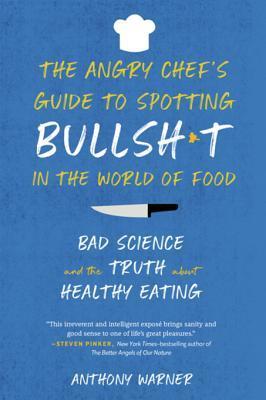
The Angry Chef''s Guide to Spotting Bullshit in the World of Food by Anthony Warner
Why does chef Anthony Warner go by "the angry chef"? He's tired of food bullsh*t and pseudoscience masquerading as truth and fact. In this book he discusses pseudoscience and why it's so easy to convince people that a certain diet is THE way to lose weight/be healthy/live your best life/etc. It was really interesting when he discussed why our brains are wired to want connections and simple explanations when nutritional science is not always that simple. He takes on many popular diet trends like keto, paleo, and detoxing and basically rips the pseudoscience behind them apart. While I didn't agree with every word he said, for the most part I was already on his side before I even read the book. He does a great job explaining the bits of science that are used to create trends and why they aren't right and in some cases can even be dangerous to follow. If you miss bread or want to enjoy a cupcake every once in awhile the angry chef agrees. His diet advice is to eat in moderation and eat a varied diet - cutting out whole food groups is NOT good. If you're not sure where to turn with all the various diets and superfoods out there give this book a try and see if you agree with The Angry Chef's Guide to Spotting Bullsh*t in the World of Food.
The Angry Chef's Rules for Spotting Bullsh*t in Food
1) They will have a food philosophy.
2) They will try to sell you detox.
3) They will tell you that your illness is your own fault.
4) They will fit the health-blogger template.
5) They will tell you that the truth is not up for debate.
6) They will talk about superfoods.
7) They will use anecdotes as evidence.
8) They will quote ancient wisdoms at you as fact.
9) They will tell you things were better "back then."
10) They will tell you all these things with great certainty.
Some quotes I liked:
"I generally pride myself on an ability to pick apart the misunderstandings and confusions that result in false beliefs being born, but in the case of detox diets and detox products, there is no mystery to pick apart. Despite it being a multibillion-dollar industry, no clinical study has shown any commercially available detox diet or treatment to have any clinical effect in the removal of toxins." (p. 25)
[Best subheading EVER] "WTF is wrong with potatoes" (p.121)
"If you cannot fit potatoes into a healthy balanced diet, there is something wrong with the way you are eating. They are a near perfect food, and to create rules that exclude them not only feels wrong, it is wrong." (p. 123)
"Sugar is just sugar. It is not good or bad. It is only toxic if you eat too much of it, and by that measure all food is toxic (remember the does makes the poison: you can die from drinking too much water)...To attach the language of toxicity and addiction to a food we literally cannot avoid means pouring vitriol and scorn on all of us...If you are not sugar-free, if your children are not sugar-free, then you are toxic, you are contaminated. You and your kin are foul and pestilent junkies, no longer worthy, no longer deserving of medical treatment, contaminated and beyond hope, destined to die fat, lonely, miserable, and addicted." (p. 149)
"Sugar is important. It is the sweetness of freshly picked peas. It is in the bliss of strawberries warmed by the sun. The sweetness of foods can enrich our lives; it can bring us joy and pleasure. Sweetness is a vital part of the flavor palette of every cook and true sweetness comes only from sugar...To dismiss and reject the use of sugar because of false notions of toxicity is to misunderstand what it is to eat healthily. A healthy diet is one of joy, not one of rejection and denial." (p. 151)
"Social media creates many closed, self-affirming populations capable of perpetuating and reinforcing falsehoods. Ideas don't have to travel the world to do a lot of damage." (p. 281)

Dopsick: dealers, doctors, and the drug company that addicted America by Beth Macy
In Dopesick Beth Macy delves into the opioid epidemic that has been sweeping through the country for the past 20 years. She explores small towns in Appalachia where opioid addictions started with injured and disabled former coal miners that now have teens dying of overdoses almost daily. She meets up with a convicted drug dealer who moved from Baltimore into the small town of Woodstock, Virginia because he could make more money with less competition than in Baltimore. Macy also exposes the grief of parents whose children died, sometimes the first time they ever used opioids. While a lot of the statistics are overwhelming Macy finds small pockets of doctors and nurses working in free clinics to try to help the poorest of the poor fight their addictions and also fight back against the drug companies that pushed opioids on unsuspecting patients. The most frustrating part of the book was reading about how Oxycontin was created and then relentlessly pushed on doctors and patients even when doctors were reporting accidental addictions just from patients taking the medication as prescribed. This just further highlights how money trumps everything. The huge amounts of money and bonuses made from Oxycontin in the pharmaceutical world was why no one cared when people started abusing these drugs and dying. Even now after all the media attention about opioids there are still doctors thoughtlessly prescribing 30-60 supplies of opioids to patients who don't need that level of painkiller. A very eye-opening and sad look at an on-going health crisis in America.
Some quotes I liked:
"The Harrison Narcotics Act of 1914 severely restricted the sale and possession of heroin and other narcotic drugs, and by 1924 the manufacture of heroin was outlawed, twenty-six years after Bayer's pill came to market. By the thirties, typical heroin users were working-class, and many of them were children of immigrants, along with a growing number of jazz musicians and other creative types, all now reliant on criminal drug networks to feed their vicious habit - and keep their dopesickness at bay. The addicted were now termed 'junkies,' inner-city users who supported their habit by collecting and selling scrap metal. The 'respectable' upper- and middle-class opium and morphine addicts having died out, the remaining addicted were reclassified as criminals, not patients." (p. 25-6)
"Van Zee didn't yet grasp what was truly driving the furious rate of overprescription. Sales-rep bonuses were growing exponentially, from $1 million in 1996, the year OxyContin hit the market, to $40 million in 2001...Purdue conducted more than forty national pain management and speaker-training conferences, luring doctors to resorts from Boca Raton, Florida, to Scottsdale, Arizona...More than five thousand doctors, nurses, and pharmacists attended the conferences during the drug's first five years - all expenses paid." (p. 47)
"What in fact was the addiction rate among those prescribed opioids for chronic nonmalignant pain? More recent studies - not letters to the editor penned in 1980 - put the figure as high as 56 percent." (p. 95)
"Though his mother, Ginger Mumpower, had sent him to fifteen different rehab facilities, for eight years Spencer managed to use and sell drugs before his name ever entered a police blotter...As his counselor Vinnie Dabney remembered it, 'Fifteen rehabs had not convinced Spencer that it was not in his best interests to get high. It took time in jail and a friend dying before he could decide he wanted to change.'" (p. 117-8)
"Emergency-room administrator Dr. John Burton watched the cultural shift play out at the North Carolina YMCA summer camp he attended as a kid and returned to later as the camp doctor. Whereas very few campers took prescribed medications in the 1970's, by the mid-1990s 10 percent were taking a pill at some point during the day - most for asthma or allergy conditions, followed by a small set of kids on behavioral medications, usually for ADHD. By 2012, fully one-third of his campers were on meds, mostly ADHD medications, antidepressants, and antipsychotics. 'What happens is, we've changed our whole culture, from one where kids don't take pills at all to one where you've got a third or more of kids who are on pills to stay well because of what are believed to be chronic health conditions,' Burton said. 'They get so used to taking pills that eventually they end up using them for a recreational high.'" (p. 135)
"Why had blacks failed to become ensnared in opioid addiction? That question was addressed in 2014 data issued by the Centers for Disease Control and Prevention: Doctors didn't trust people of color not to abuse opioids, so they prescribed them painkillers at far lower rates than they did whites. 'It's a case where racial stereotyping actually seems to be having a protective effect,' marveled researcher Dr. Andrew Kolodny of Brandeis University. Put another way: By 2014, while young whites were dying of overdose at a rate three times higher than they did in 2002, the death rate for people of color was relatively unchanged." (p. 253-4)
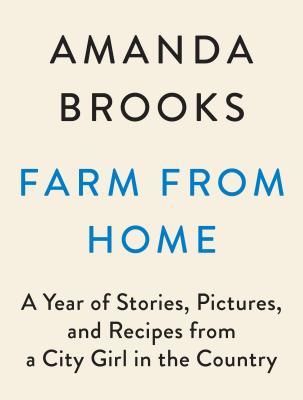
Farm From Home by Amanda Brooks
I thought I was really going to like this book based on the description - a family living in New York City feels like their life is too hectic and decide to take a one year sabbatical to the father's family farm in England, but never come back to NY and stay on the farm full time. The book is set up by months starting in June, which was the month they moved to England. Each month Brooks takes readers through what that month is typically like on the farm - activities, recipes, photos, etc. About half-way through she started to get on my nerves. They obviously have TONS of money - living on the farm with not much talk of jobs or income and keeping their NY apartment too. They also travel and frequently go "somewhere tropical" during the coldest part of winter. Maybe I just don't understand it, but the chapter on fox hunting and the social importance of hunting (not actual hunting for food, but horseback riding that's "hunting" now a fox scent since actual fox hunting is illegal) seemed so elitist and terrible. That kind of turned me off to the book as a whole. While I like the idea of taking a sabbatical from city life and living on a working farm, this was more of farming as an English hobby which was off-putting to me. I gave it 3 stars though because the photographs are beautiful and the chapter with all the baby animal pictures was worth looking through the book for. Overall, I would skip this one for actual farm memoirs or better memoirs about leaving hectic city life for a simpler life.
